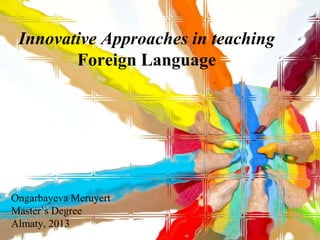
Traditions and innovations in learning a foreign language
- 1. Innovative Approaches in teaching Foreign Language Ongarbayeva Meruyert Master`s Degree Almaty, 2013
- 3. “I am not a teacher, but an awakener.” ― Robert Frost “Tell me and I forget. Teach me and I remember. Involve me and I learn.” Benjamin Franklin L/O/G/O
- 4. 1-The Communicative approach in FLT. Education through communication is the essence of all intensive methods of learning a foreign language. Serves to meet the challenges of "social interaction“. This approach creates a positive environment for the active and the free development of the individual. In general, these conditions are as follows: 1-Students have the opportunity to freely express their thoughts and feelings in the process of communication; 2-Participants feel safe from criticism for mistakes and errors; 3-Expression of personality is more important than the demonstration of language skills; 4-Relationships are built on empathy and understanding feelings of others.
- 5. Functionality Awareness in functional Functionality purposes of the target Each student has to understand what can give a language in practice Situational Speech based Communicative learning is based on the situations, Teach only through communication understood as a system of -interferring from the text relationships.It serves as a -role-playing and problem-solving motivation for the speech -game challenge activity. The Basic Principles of Modelling Communicative It is necessary to select a Method are certain amount of knowledge Novelty to present the culture as a Novelty in speech situations model.1-Conditionally-speech (changing the subject of exercises-repetitive lexical communication, discuss items.2.Speech exc.(retelling problems, etc.). texts,description of The novelty of the material Personal-oriented pictures,people,comment on (its informativeness). Situational communication. events).Provide with speech The novelty provides rejection provoking exc-es. of learning by heart Speech is always individual. (statements, dialogues, texts, Educational system should etc.), develops speech take into account the cognitive production, productivity. needs of students according to their interests, hobbies).
- 6. 2-Cultural approach in teaching of Intercultural Communication Speech -oriented principle. Conditionally-speech based and 1 speech exc-es. The principle of adequacy of exc-es (a gradual transition from 2 receptive to reproductive and productive exc-es). Modeling Principle of simulated situations of intercultural 3 communication (modeling parameters are intercultural situations, participants, their values, judgments, communicative intentions and communicative expectations, their background knowledge). The principle of consciousness (using comparative-linguistic and 4 comparative-cultural exc., identify the characteristics of intercultural communication and the creation of knowledge and understanding of it). 5 The principle of rational use of native language. (Speech and language phenomena of foreign language are included in the exercises to contrast them).
- 7. 2-Cultural approach 6- The Principle The learning process is organized on of Modularity the basis of modules corresponding to the features of the Foreign culture and own culture. 7- Principle of By minimizing the training material and maximize its repetitiveness in ex- accessibility and es for use in speech activity in systematicness situations of intercultural dialogue. Focuses on the motivational sphere of English language learners. All psychological motives are divided into 8- The principle of three groups: the intellectual, moral, personal learning needs emotional and aesthetic. of students
- 8. 3-Competence- based approach
- 9. 3-Competence-based Approach -(CBE) has been used in adult ESL literacy instruction since the mid-1970s. ). - In 1975, the Adult Performance Level project identified a set of competencies (knowledge and skills) viewed as basic for adults to function in the United States (Adult Performance Level Project, 1975). - CBE formed the basis for the language and orientation programs in most refugee programs overseas in the 1970s and 80s and in many U.S. programs. selection of competences instruction targeted to based on learners needs those competences evaluation of assessment Components of learner of learner performance needs CBA
- 10. language speech socio- communi cultural cative
- 11. 4-Problem- based teaching approach of FL Problem situation- awakens mind, activates thinking Psychological Pedagogical 1-Activities of the students. 1-Organization of the learning process. Teacher creates a problematic situation
- 12. Basic ways to create Problematic Situations Ask • Motivate students to the theoretical explanation of phenomena, facts, differences between them. • Use of educational and life situations them • State the problem and tasks to explain or find ways of its practical application. • To motivate students to make analysis and synthesis of the material. •The different points of view on the same Questions issue, of the phenomenon from different perspectives (eg, commander, lawyer, financier, teacher).
- 13. For the formation of regulatory and communication skills exercises must be "contact-establishing“, causative-effect, stimulating communication, with usage of stereotypical clichés, greetings, messages, awareness, appreciation, etc., used in the business and professional communication. Problem 1.1. Canadian company offers you (CEO of a manufacturing company) present you in Canada as a distributor. You monitored advantages of the company and it suits your needs. • What position in the negotiations you should take with the knowledge of the company and its representatives? • What kind of variants to come into contact and start negotiations you intend to use and why? • Should you demonstrate our interest in cooperation, and if not, how you are going to present the main purpose of the meeting? • How you think the behavior of the partner will be, if you don`t not accept their offers? [Кунанбаева С.С. “Современная теория и практика иноязычного образования” Алматы, 2010 – 350 с.]
- 14. 5- Informational Technologies in FLT. Modern tools: personal computers, scanners, computer printers, internet projectors, multimedia interactive whiteboard.
- 15. Life of children Life of school
- 16. 5- Informational Technologies in FLT. Types of work with PC USED by teacher on the lesson. Make programs in various Use educational programs on CD applications. Web 2.0 (www.wordle.net, "Triple Play Plus" http://lingualeo.ru/, http://edu.glogster.com/, "Euro Talk. Elementary" http://livemocha.com/ Professional electronic portfolio of foreign language "Professor Higgins" teacher.
- 17. Thank You! L/O/G/O
- 18. Thank You! L/O/G/O
- 19. Thank You For Your Attention!!! L/O/G/O
